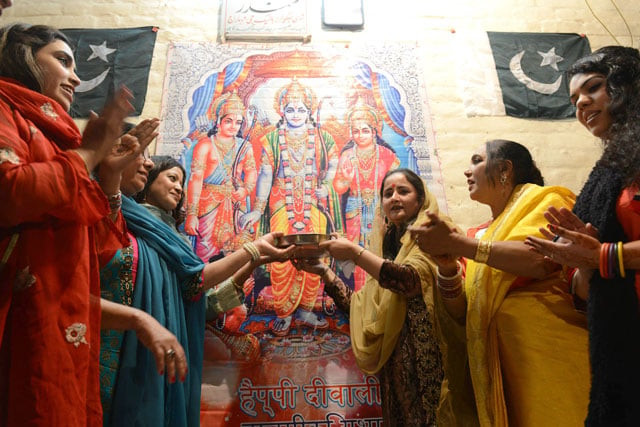NCHR flags growth of seminaries in Thar
Rural district is home to over 70% of Pakistani Hindus

PHOTO: TARIQ HASSAN/EXPRESS
The National Commission for Human Rights (NCHR) has flagged the mushrooming growth of seminaries in Tharparkar – home to over 70% Pakistani Hindus – as a “serious reality not to be left unattended”.
“This [issue] must be overseen...and should not be left unattended as has been done in the rest of the country,” said NCHR Chairman Justice (retd) Ali Nawaz Chowhan while unveiling a report of the commission regarding deaths of children in Tharparkar in December 2015. “There have been several cases of forced conversion of Hindus which is a matter of concern.”
The report has been compiled after field visits to the drought-affected region and gives a glimpse of ground realities regarding access to food, development, healthcare, water supply and the government’s relief efforts and resource allocation.
“The proliferation of religious institutions is a serious reality in the district,” the report states. “This is despite the fact that Tharparkar houses a vast majority of the Hindu community rather than a Muslim population.”
The report further warns anything that disturbs the communal harmony of the region needs to be discouraged. “We watch this development with utmost alarm as the state exercises limited control over the functioning of the madrassas while lacking the capacity to intervene in the curriculum of these institutions.”
Though the human rights panel has highlighted issues and pointed out the weak links, it has not set any deadline for federal and provincial governments to implement its recommendations.
“We have released this report through the media and will see what action is taken in the coming days,” Chowhan said.
Who’s responsible?
About the frequent deaths of children in Tharparkar, the NCHR chairman said the Sindh government and its departments of health, education and local administration should be held accountable.
But he also did not exonerate the federal government, saying though drought is a provincial subject, the federation is “required to play its role, which has not been visible”.
“A keen eye on Tharparkar along with political will and commitment to protect the rights of citizens would have surely prevented these deaths,” the commission wrote in its report.
The panel censured political postings, saying they had carried negative impacts before and after the crisis. “Because of the political postings, people at important positions were found to be either absent from or neglecting their duties with impunity,” the report said. “There is absolutely no supervision of the commissioner of the division.
Chowhan recommended the federal government “allocate Rs750 million, in addition to the human rights ministry’s regular budget, for the relief of the people of Thar”.
About healthcare in Tharparkar, the report states there is only one hospital in the district for a population of 1.3 million and only 14 ambulances. “We are disturbed to learn that at the time of the crisis, neither lady health workers were working because of unpaid salaries for months nor the 189 dispensaries established across the district were functional.”
The field visits also revealed that doctors were busy in private practice and had refused to be transferred to Tharparkar.
In order to deal with the problem, the commission has recommended imposition of the Essential Services Act to compel government doctors to perform their duties in Tharparkar.
Published in The Express Tribune, April 13th, 2016.



















COMMENTS
Comments are moderated and generally will be posted if they are on-topic and not abusive.
For more information, please see our Comments FAQ